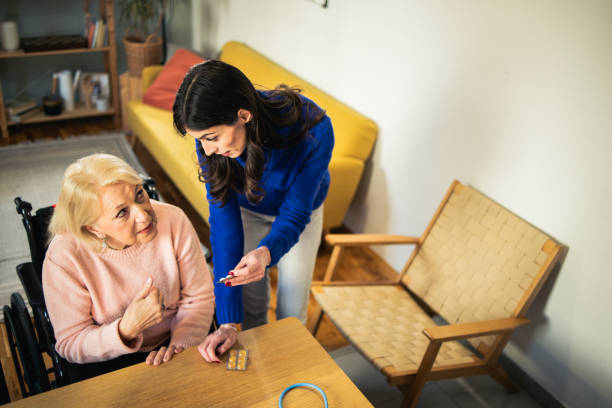The role of a family caregiver is both rewarding and challenging, often filled with emotional and physical demands. As more families seek alternatives to institutionalized care for their loved ones, home health care services are emerging as a crucial support system, offering much-needed relief and assistance to family caregivers. These services not only ensure that individuals receive professional medical care in the comfort of their homes but also play a vital role in empowering family caregivers by offering resources, respite, and support. In this article, we will explore the different ways home health care services can empower family caregivers, helping them to balance their caregiving duties with their personal well-being.
1. Providing Professional Medical Support
One of the primary benefits of home health care services is access to professional medical care. Family caregivers are often thrust into their roles without formal medical training, yet they are expected to manage complex health issues such as medication administration, wound care, or managing chronic conditions like diabetes or heart disease.
Home health care services provide trained nurses, physical therapists, and other medical professionals who can handle these responsibilities, giving caregivers peace of mind. This not only ensures that patients receive the correct care but also relieves family caregivers from the stress of managing medical tasks they might feel unprepared for. Having a medical expert to turn to for advice or intervention empowers caregivers to provide better care for their loved ones without feeling overwhelmed.
2. Reducing Caregiver Burnout
Caregiver burnout is a real and growing problem, especially for those who provide care for long-term or critically ill patients. The constant demands of caregiving can take a toll on a caregiver’s physical, emotional, and mental well-being. This is where home health care services step in to provide much-needed relief.
By sharing caregiving responsibilities with professional home health aides or nurses, family caregivers can take a break from the day-to-day pressures. Whether it’s for a few hours or a few days a week, having assistance at home allows caregivers time to rest, attend to personal needs, or even just have some mental downtime. This respite prevents burnout and empowers caregivers to continue providing care without compromising their own health.
3. Enhancing Quality of Life for Caregivers and Patients
Home Care Philadelphia services often focus on enhancing the quality of life for both patients and their caregivers. For patients, receiving care at home means being in a familiar, comforting environment surrounded by loved ones, which can have positive effects on their mental and emotional well-being. This also translates to a more positive caregiving experience for family members.
Family caregivers benefit from knowing that their loved one is receiving professional, high-quality care. This knowledge reduces anxiety and guilt that many caregivers feel when they are unable to meet all the demands of caregiving on their own. Additionally, because Home Care Philadelphia services are tailored to meet the specific needs of each patient, caregivers can ensure that their loved ones are receiving personalized care without sacrificing their own well-being.
4. Teaching Caregivers Essential Skills
Another empowering aspect of home health care services is the education they provide to family caregivers. Many home health care professionals are trained to not only care for the patient but also to teach caregivers how to manage various aspects of care. This includes learning how to properly administer medication, use medical equipment, monitor vital signs, and even handle emergencies.
By providing this training, home health care services give family caregivers the confidence to manage their loved one’s care effectively. Instead of feeling uncertain or anxious about their abilities, caregivers can feel empowered to take on tasks they may have previously found daunting. This shared knowledge also fosters better communication between caregivers and home health professionals, resulting in more comprehensive care for the patient.
5. Offering Emotional and Psychological Support
Caring for a loved one, especially a chronically ill or elderly family member, can be emotionally taxing. Family caregivers often experience feelings of isolation, depression, or anxiety, especially if they are managing the caregiving responsibilities alone. Home health care services offer not just medical and practical support, but emotional support as well.
Many home health care agencies provide counseling services or access to support groups where caregivers can talk to professionals or peers who understand the challenges they face. This emotional support network is crucial for caregivers to cope with the stress, grief, and emotional strain that often accompanies caregiving. By offering these resources, home health care services empower caregivers to not only take care of their loved ones but also prioritize their own emotional well-being.
6. Encouraging Independence and Self-Care
Home health care services allow caregivers to step back and focus on their own lives, careers, and personal goals without feeling guilty or neglectful. By entrusting certain aspects of care to professionals, caregivers are encouraged to maintain their own independence and well-being. This balance is critical, as caregivers who neglect their own health and personal needs are at a higher risk of burnout and illness.
In this way, home health care services empower family caregivers by encouraging them to focus on self-care. Whether it’s engaging in hobbies, pursuing career goals, or simply taking time to relax, caregivers can feel more in control of their own lives while still fulfilling their caregiving duties.
7. Flexibility and Personalized Care Plans
Home health care services are highly flexible, offering care plans that are tailored to the unique needs of each patient and caregiver. This personalized approach ensures that caregivers are not overwhelmed by a one-size-fits-all care plan. Whether a family needs short-term care after surgery or long-term care for a chronic condition, home health care services can be adjusted accordingly.
The flexibility offered by home health care empowers caregivers to arrange care that fits around their schedules, allowing them to maintain their personal and professional commitments. Caregivers can choose the type and amount of care needed, whether it’s daily visits from a nurse or weekly check-ins from a physical therapist.
Conclusion
Philadelphia Home Care services play an invaluable role in empowering family caregivers. By offering professional medical support, reducing burnout, enhancing quality of life, providing essential training, and encouraging self-care, these services alleviate many of the pressures associated with caregiving. For family caregivers, knowing they have a trusted support system allows them to provide better care for their loved ones while maintaining their own health and well-being. Ultimately, Philadelphia Home Care services create a balanced, compassionate caregiving experience, benefiting both patients and their families.



